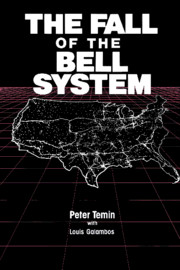Book contents
4 - The conflict broadens
Published online by Cambridge University Press: 06 January 2010
Summary
The Consumer Communications Reform Act of 1976
John deButts was incensed by the government's antitrust suit. The charges were, he thought, baseless. AT&T – a company that was above all a good corporate citizen – had surely not broken the law. The telephone company had tried to accommodate the FCC's new policies toward terminal equipment, subject only to the need to protect the telephone network. It had given MCI everything that it was entitled to at any time, albeit not an inch more or a moment early. The problems that had arisen were, in deButts's view, the result of excess zeal in carrying out the Bell System's mission or of the repeated shifts in direction that the FCC had made – shifts that made planning a precarious enterprise. This was certainly not the stuff of a major antitrust suit. As for breaking up the Bell System: “If it ain't broke, don't fix it.”
The courtroom seemed a poor place to frame national telecommunications policy, and deButts sought to shift to personal negotiations with members of the President's cabinet, or their lawyers. He was in constant touch with members of Ford's cabinet about other matters. Negotiations had ended the previous suit, and negotiations had produced the agreement on separations that had solved the problem of wartime telephone pricing.
But relations between AT&T and the federal government – in particular the FCC – had soured in recent years. The TELPAK controversy had been handled in a confrontational manner, and during the mid-1960s the agency had taken a step toward a more formal adversarial relationship when it instituted its first major investigation of the Bell System's rate base and rate of return.
- Type
- Chapter
- Information
- The Fall of the Bell SystemA Study in Prices and Politics, pp. 113 - 159Publisher: Cambridge University PressPrint publication year: 1987



